There is a thread emerging from the fallout of the 737 MAX crash investigations that is likely to impact not only Boeing but all of its supply chain. A Joint Authorities Technical Review (JATR) committee of worldwide aviation authorities is reviewing the FAA’s 737 MAX certification process. The contention in some circles is that the FAA delegated too much inspection and certification oversight to Boeing and that, in its effort to bring the MAX to the market quickly and maximize profits, Boeing sacrificed quality. As a result, there have been calls to put substantially all inspection and certification back into the FAA. However, that is unlikely to happen. The FAA lacks the resources to take on all of the inspections and approvals delegated to Boeing and to do so would be quite expensive. Just as importantly, what we are talking about is the certification of a new platform. Putting all of this under the FAA’s purview would require the FAA to hire qualified inspectors at the exact same time that Boeing and its supply chain would also need to hire the same resources to support the surge in inspections required for a new program. Additionally, the overall safety record of the industry has been remarkably good over the years and especially in the past few years (up to the crashes). Consequently, implementing such costly and sweeping changes seems highly unlikely. What is known for sure, though, is that the JATR will come out with a recommendation, and that recommendation is likely to impact Boeing’s global supply chain.
The most likely outcome of these reviews is that the FAA will take a much more critical look at the delegation process, will conduct more audits and, when there are findings of potential risk in the audits, will impose more stringent corrective actions on Boeing. Keep in mind, though, that Boeing and its supply chain have also adopted the practice of using delegated acceptance programs. Setting aside for the moment that the MAX problems were not the result of problems in the supply chain, Boeing has certainly experienced supply chain quality issues in the past. It is likely that Boeing will question whether its process with its suppliers also suffers from the same risk exposure as the FAA process did with Boeing. Like the FAA, Boeing will likely step up its oversight of delegated inspection programs within the supply chain. This will include demanding the same kind of enhanced oversight from Tier Ones – oversight that will be pushed down to every sub-tier. The probable outcome is that Tier Two and Three suppliers will find it harder to maintain their delegated acceptance authority.
Why does this matter? In short, losing delegated acceptance approval introduces production delays and costs money – significant money. Most contracts from buyers to suppliers make it the supplier’s responsibility to pay for third-party inspectors to inspect their parts if they lose their delegated acceptance approval. This results not only in margin erosion due to the added cost, but also delays in shipment. Given that losing your delegated acceptance approval is not considered an excusable delay, it can also result in financial damages asserted for late shipments. A typical contract clause from a Boeing Tier One assesses a charge of 1% of the value of a delayed shipment from a supplier per day of delay. We have seen assertions against suppliers run into the millions in 2018 on the MAX. Furthermore, from an industry standpoint if just a few high-volume suppliers lose their delegation at the same time, then the delays of getting third-party inspectors in to approve shipments will be significant. This obviously is something that Boeing and the Tier Ones would be concerned about but in today’s environment, they can’t afford to be seen as relaxing quality requirements to maintain schedule.
The delegated acceptance environment is going to change. What were once minor findings or recommendations are likely to become major findings with immediate corrective actions required. What should suppliers do? This is a good time for the Board of Directors and/or senior executives to conduct an internal audit of their quality system with emphasis their own supply chain quality program and their customer’s requirements to maintain delegated acceptance. Said with the utmost respect for the people responsible for supply chain quality (after all, I was one of them) I would suggest using a third party for two reasons. First, the current organization is busy doing what must be done to maintain operational efficiency in today’s environment and so the audit is unlikely to receive the attention that it needs. Second, those in the quality organization take their responsibilities seriously. If flaws are seen by them, they are already raising these concerns. What needs to be addressed are the unknown areas of weakness that are likely to be points of emphasis in tomorrow’s delegated acceptance environment.

Authoritative Actionable
Consulting in Aerospace
Sign up for our newsletter today!